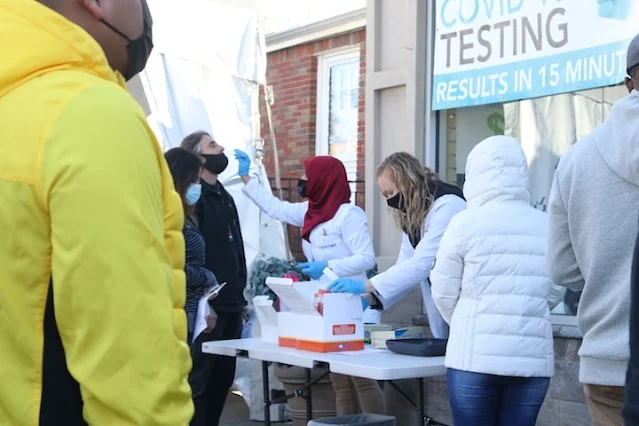Who Ought to Get a Coronavirus Promoter Now? New Information Offers Some Lucidity.
On
the off chance that you are high-risk, the response is clear. On the off chance
that you are generally safe, there is less agreement.
Three
years into the pandemic, it has become clear that Coronavirus is staying put, nor
are immunization promoters.
Last
week, a warning advisory group to the Food and Medication Organization
consistently concurred that the immunization and supporter process for
Coronavirus should be improved on as far as which variant of the shot is
offered and when and how frequently individuals ought to get it. There was less
agreement about what that worked on interaction will resemble.
The
F.D.A's. want to smooth out immunization proposals is an impression of exactly
the way that muddled and befuddling they have become.
At
the point when the bivalent sponsor, which targets both the first Covid strain
and the BA.4/BA.5 Omicron subvariants, was carried out in September 2022, there
was little information about how well it would function. However, the reason
for the choice was moderately clear: The infection is advancing, thus should
the immunization. Throughout the course of recent months, as the consequences
of beginning examinations have come in, the image has gotten murkier.
The
uplifting news is the bivalent promoter seems to give security against extreme
disease, which is basic for high-risk people. It "is improving of
insurance, both for indicative contaminations" and hospitalizations, said
Dr. Eric Topol, chief VP of Scripps Exploration.
The
overall advantage for okay populaces, who are probably not going to bite the
dust or be hospitalized from Coronavirus, is less clear. There are likewise
inquiries of how frequently individuals ought to get supported and how the
antibody ought to be refreshed as the infection develops.
This is the very thing that we right now have some familiarity with the bivalent promoter and how to choose when — and if — you ought to have your next chance.
On the off chance that you're high-risk, get a supporter
For
individuals who are high-risk — to be specific grown-ups age 50 and more
established and individuals who are immunocompromised or have a fundamental
condition — the proof is clear: On the off chance that you haven't gotten the
bivalent promoter, you ought to. Simply ensure it's been something like three
months since your last shot or Coronavirus contamination.
Supporting this proposal is information introduced by Pfizer and Moderna at the F.D.A. meeting, alongside four examinations distributed in January in the New Britain Diary of Medication. That examination found that individuals who got the bivalent supporter had an expansion in immunizer levels. This proposes it worked on resistant safeguards against the infection, however it didn't safeguard against the new strains as well as it did against the old ones.
The
greatest leap was in antibodies that focus on the first kind of the Covid
(albeit that variant is done circling, so it's muddled the way in which
accommodating those antibodies are). Antibodies that target BA.5, which was the
prevailing strain the previous summer and fall, likewise expanded considerably.
The littlest lift was seen for antibodies that guard against a portion of the
fresher Omicron subvariants that have more immunizer dodging transformations,
like BQ.1.1 and XBB (the ongoing predominant strain, XBB.1.5, wasn't flowing when
the examinations were led).
"There's
an unmistakable step down" in security as the variations keep on
advancing, said Dr. Dan Barouch, a teacher of medication at Harvard Clinical
School who drove one of the investigations.
With
regards to safeguarding against serious sickness, the bivalent promoter
admissions well in reality, research from the Communities for Infectious
prevention and Anticipation shows. One investigation discovered that it was
somewhere around 38% successful at forestalling hospitalization for
Coronavirus, and the additional time that had elapsed since somebody's past immunization
portion, the more the bivalent sponsor made a difference. Likewise, a
subsequent report, zeroing in on grown-ups 65 and more seasoned, found that
individuals who had gotten the bivalent sponsor a normal of 30 days earlier
were 73% less inclined to be hospitalized than those who'd got just the first
immunization or the antibody in addition to the underlying single-strain (or
monovalent) supporter a normal of almost a year earlier.
How can I boost my immune system quickly?
In
any case, it's difficult to tell whether the additional advantage of the
bivalent sponsor was on the grounds that it expanded security against the
Omicron subvariants or on the grounds that less time had elapsed since
individuals got it. Antibodies wind down over the long haul — that is the
reason the C.D.C. furthermore, F.D.A. begun suggesting sponsors in any case —
so it's not shocking individuals would be better safeguarded the more as of
late they'd had a shot.
Regardless,
Dr. Barouch said, "for individuals at high gamble of extreme complexities
of Coronavirus, it seems OK to get supported on the grounds that it has shown a
decrease of serious sickness, basically for a concise timeframe."
The supporters additionally have all the earmarks of being protected in a mind-boggling greater part of cases. Last month, the F.D.A. also, C.D.C. given a joint proclamation that said there was starter proof the bivalent promoter might raise the gamble of stroke in grown-ups beyond 65 years old. In any case, refreshed information uncovered that it was on the grounds that the correlation bunch had less strokes than ordinary, not on the grounds that the as of late helped bunch had more.
In the event that you're generally safe, proposals are less clear
For
individuals who are under 50 and don't have an expanded gamble of serious
infection, there's to a greater extent a discussion about whether one more shot
is worth it. The sponsor is as yet viable, yet it is less basic to get it.
One
late review assessing the bivalent promoter in individuals beyond 12 years old
showed that it functioned admirably in people, everything being equal. The
scientists looked at how individuals fared during the three months after they
got a monovalent supporter (May to August 2022) with the three months after
individuals got a bivalent sponsor (September to December 2022). They observed
that the monovalent promoter was 25% compelling at forestalling hospitalization
or demise, while the bivalent sponsor was 62% powerful.
Albeit
the sponsor worked for everybody, specialists say on the grounds that more
established grown-ups are substantially more prone to be hospitalized for
Coronavirus, they will encounter a more prominent advantage. "Regardless
of whether this viability is something similar, more seasoned individuals
genuinely must get supported in light of the fact that their outright gamble is
higher," said Danyu Lin, a teacher of biostatistics at the College of
North Carolina at Church Slope who drove the exploration.
A
C.D.C. concentrate on taking a gander at whether the bivalent sponsor
safeguards against contamination in individuals matured 18 to 49 was likewise
uplifting. Contrasted and individuals who got somewhere in the range of two and
four dosages of the first immunization, individuals who got the bivalent
supporter were approximately 50% less inclined to have a suggestive disease from
either BA.5 or XBB/XBB.1.5.
Be
that as it may, similarly as with the first immunization, the bivalent
supporter marginally builds the gamble of myocarditis, irritation of the heart
muscle, in individuals matured 18 to 35. Accordingly, a few specialists are
reluctant to prescribe more sponsor dosages to this gathering.
How can I boost my immune system quickly?
"Assuming
you're youthful, say you're 35, 40, you're generally solid, you've proactively
gotten immunization and supported and most likely had a contamination or two
previously, I believe that individual is basically safeguarded for a long
while," said Dr. David Ho, a teacher of medication at Columbia College who
drove one of the neutralizer studies. "Until additional information is
accessible, I wouldn't force such an individual to get a yearly
immunization."
What will promoters resemble in the next few long stretches of time?
The
F.D.A. has recommended that, for most Americans, the sponsor could be given
yearly in the fall, similar to this season's virus immunization, and high-risk
people might in any case get different portions a year. It's not satisfactory
when, or on the other hand on the off chance that, it will officially suggest this
methodology.
Dr.
Lin has unpublished exploration contrasting results by the quantity of sponsor
portions individuals get each year. His information shows that individuals who
normal short of what one sponsor a year have higher hospitalization and passing
rates than individuals who get at least one dosages. There is a lot more modest
distinction among one and more than one promoter portion each year. He said
this proposed that a yearly promoter was adequate for the vast majority;
nonetheless, for more established grown-ups, even the little advantage got from
various sponsors a year is presumably beneficial.
In
light of the new discoveries, there is all agreement that assuming that you are
at high gamble, getting an immunization supporter to some extent yearly, and
perhaps more much of the time, keeps on being significant. For youthful, sound
individuals, however, the choice of when to get a promoter, or whether to get
one by any means, is more person. The C.D.C. furthermore, F.D.A. suggest
sponsors for everybody, except certain specialists are less bullish on the
thought.
"I
suppose on the off chance that you haven't had a supporter over the most recent
a half year, and in the event that you're over age 50 or considerably over age
40, you will get some additional security from ending up in the medical clinic
or in any event, kicking the bucket," Dr. Topol said. "The case
between age 5 and 40 is serious areas of strength for less those individuals"
are seldom hospitalized."
"The
well-qualified assessment is partitioned on whether youthful, solid individuals
ought to get supported," said Dr. Barouch. "Everybody concurs that
the general advantage is more prominent in individuals who are generally
powerless against sickness."













0 Comments